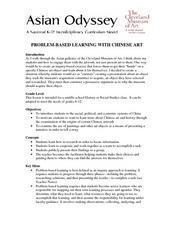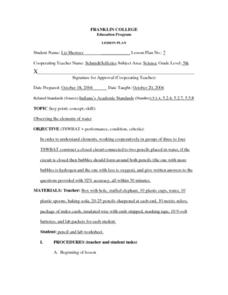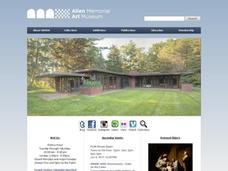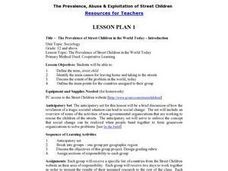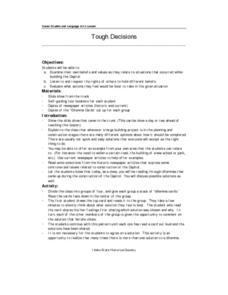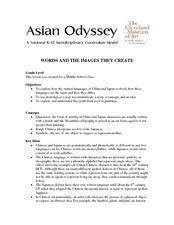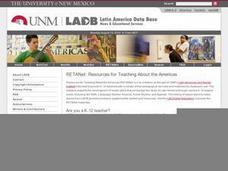Curated OER
Do the Right Thing
Students define integrity and responsibility, then discuss the motto "Do the Right Thing." students participate in teacher-generated problems in small groups.
Curated OER
Fly Swatter Spelling
Young scholars practice spelling words by swatting fake insects. In this vocabulary lesson plan, students participate in a spelling game in which teams must spell a word correctly one letter at a time. Young scholars may fix...
Curated OER
How Did We Arrive at the Printed Book?
Seventh graders, in cooperative learning groups, research the development of book printing. After examining a story written on a scroll, an accordion book, and a printed copy, they evaluate them according to a certain criteria and...
Curated OER
Dr. Seuss: Horton Hears a Who?
Second graders listen to Horton Hears a Who? and complete a study of word cooperation. They group the words into families to see chunking.
Curated OER
Introduction to Junkanoo! A Bahamian Festival
Learners examine a Bahamian festival called Junkanoo. They analyze how group cooperation is related to the festival. They finally identify how factions form and how they can help or hurt a community.
Curated OER
The United States Constitution
Twelfth graders research how the constitution was formed and the reasons for its implementation. They form a class wide constitution that expresses the steps originally used while forming the original constitution. Students vote and...
Curated OER
Prejudice Discussion
High schoolers discuss ethical dilemmas in a cooperative setting, and compare today's social problems with those present during the rise of the Nazi party.
Curated OER
Portrait Part Collage
Fifth graders study the concept of self-potraiture using examples. They create their own portraits that are put into a class collage. The skills of working cooperatively with art and appreciation of classmate's work is practiced.
Curated OER
Toward Civilization
Students are asked to define the term civilization. They work in small groups, each group is given the option of researching either the Neanderthal civilization or that of ancient Egypt. Students apply their definition to two different...
Curated OER
Historical Fiction: Introducting Novels into History
Ninth graders read a novel for their foreign language class which is also used in their history class. In groups, they work together to complete stations and other assignments.
Curated OER
Problem-Based Learning With Chinese Art
Students form small, cooperative learning groups, research a major Chinese dynasty and present their findings to the classroom in this multi-day lesson adaptable to many different age levels.
Curated OER
Observing the Elements of Water
Fifth graders conduct a closed circuit experiment to observe the elements of water. They discuss the elements of Hydrogen and Oxygen, and in small groups construct a closed circuit connected to two pencils placed in water. Students...
Curated OER
Japanese Family Crests
Students create an artistic crest that represents either themselves, their group of friends, or their their family.
Curated OER
The Prevalence of Street Children in the World Today - Introduction
Students are introduced to the topic of street children. They identify the main reasons why they are lead to a live of living on the streets. In groups, they discuss the extent of the problem throughout the world today. They create an...
Curated OER
The American Rainbow
Third graders are introduced to the concept of ancestry. Using their own family, they gather information related to the family roots. In groups, they locate the countries on a map and discuss the concept of migration. They identify...
Curated OER
Creed, Christianity, and World Religions
Students research world religions and their customs online, and create group oral presentation of at least 20 minutes in length, including visuals, and quoting relevant material with its source(s).
Curated OER
Hachimaki/Shibori Lesson Plan
Sixth graders are introduced to the technique of Arashi Shibori and its history. In groups, they discover how to perform this process and examine how to do hachimaki. To end the lesson, they make their own hachimaki to wear and share it...
Curated OER
Soil Layers
Ninth graders identify the different layers of soil. In this earth science lesson, 9th graders explain how limestone layers are formed. They identify the different parts of the coral colony.
Curated OER
Fraction Card Shark
Second graders explain the relative size of fractions using symbolic and concrete representations. Groups of four students play a game which uses cards and unifix cubes. The game helps them get a visual understanding for the 'size' of...
Curated OER
Tough Decisions
Learners research a complex question. They work together to form hypothesis and research the question and analyze the data. They present their "decision" to the class based on their work.
Curated OER
Words And the Images They Create
Students explore how the written languages of China and Japan evolved, creating representations of Chinese and Japanese Poetry. Emphasis is placed on small, cooperative learning groups.
Curated OER
Development and Social Issues in the Caribbean
Pupils work together to research social issues in the Caribbean. They role-play different positions in society to determine how each group is affected. They share their results with the class.
Curated OER
The Effects of Ultra-Violet Light on Yeast
Learners work in small groups collecting and analyzing data as they learn how to best grow yeast. This lesson allows students to conduct several student-created experiments as they continually generate questions and hypotheses. ...
Curated OER
Studies of the Eastern Worlds: Cultural Maps
Seventh graders look for similarities and differences in the culture of Eastern World countries by looking at the art from each country. They test their hypothesis and assumptions through further research in the media center. Finally...










